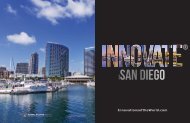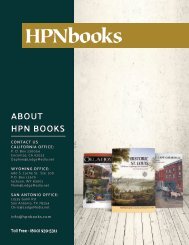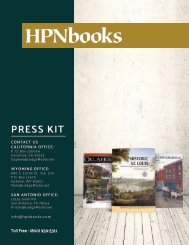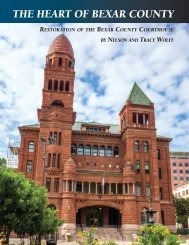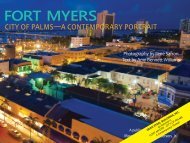In The Cradle of Industry and Liberty
An illustrated history of Philadelphia's manufacturing sector paired with the histories of local companies that make the city great.
An illustrated history of Philadelphia's manufacturing sector paired with the histories of local companies that make the city great.
You also want an ePaper? Increase the reach of your titles
YUMPU automatically turns print PDFs into web optimized ePapers that Google loves.
@<br />
Amuneal welder fabricating a piece, 2011.<br />
Located in Frankford since its founding in<br />
1965, Amuneal began as a metal shielding<br />
fabricator but in recent years has moved<br />
into design <strong>and</strong> fabrication <strong>of</strong> custom<br />
furniture, store fixtures, architectural<br />
elements, <strong>and</strong> public art.<br />
PHOTO COURTESY OF AMUNEAL..<br />
not the main driver <strong>of</strong> the city economy it<br />
had once been, they charged the Task Force<br />
with studying the state <strong>of</strong> manufacturing in<br />
the Philadelphia area <strong>and</strong> recommending<br />
ways to better support <strong>and</strong> enhance the<br />
sector. <strong>In</strong> December 2013 the Task Force<br />
issued Manufacturing Growth Strategy for<br />
Philadelphia, a comprehensive report that<br />
analyzed regional manufacturing in great<br />
detail <strong>and</strong> outlined a number <strong>of</strong> strategies to<br />
foster its growth.<br />
Looking at both the City <strong>of</strong> Philadelphia<br />
specifically <strong>and</strong> the broader eleven-county<br />
metropolitan region (including the surrounding<br />
suburban counties in Pennsylvania,<br />
New Jersey, <strong>and</strong> Delaware), the report noted<br />
that the region’s manufacturers produced<br />
$105.6 billion in annual output <strong>and</strong><br />
employed 163,000 workers. <strong>In</strong> Philadelphia<br />
specifically there were some 750 manufacturing<br />
firms employing 23,000 workers who<br />
made a total <strong>of</strong> $1.3 billion in wages. <strong>The</strong><br />
average annual salary for a Philadelphia<br />
manufacturing worker was $58,977 <strong>and</strong><br />
manufacturing was the fifth largest sector <strong>of</strong><br />
the city economy in terms <strong>of</strong> wages, behind<br />
health <strong>and</strong> social services, government,<br />
pr<strong>of</strong>essional services, <strong>and</strong> education.<br />
To coordinate implementation <strong>of</strong> the<br />
recommendations in the report a new<br />
Philadelphia Office <strong>of</strong> Manufacturing <strong>and</strong><br />
<strong>In</strong>dustry was created in early 2014.<br />
Philadelphia Deputy Mayor for Economic<br />
Development <strong>and</strong> Director <strong>of</strong> Commerce<br />
Alan Greenberger, one <strong>of</strong> the co-chairs <strong>of</strong><br />
the Manufacturing Task Force, notes that<br />
“manufacturing was an important part <strong>of</strong><br />
Philadelphia’s history <strong>and</strong> will be an integral<br />
part <strong>of</strong> its future. A robust, diverse manufacturing<br />
sector provides living wage jobs<br />
<strong>and</strong> financial mobility for all Philadelphians,<br />
while inducing indirect economic activity<br />
from suppliers, wholesalers, service providers,<br />
<strong>and</strong> utilities. With the city’s strategic location,<br />
advanced infrastructure, clustering <strong>of</strong> international<br />
leaders in energy/chemicals, transportation<br />
equipment, life sciences, <strong>and</strong> food<br />
processing, <strong>and</strong> the emergence <strong>of</strong> a growing<br />
local Makers Movement, the prospects for<br />
building Philadelphia’s manufacturing economy<br />
are exciting.”<br />
NEW FACE OF<br />
PHILADELPHIA<br />
MANUFACTURING<br />
While the city works at the macro level<br />
to improve conditions for manufacturing,<br />
Philadelphia’s many small specialty manufacturers<br />
continue to be the real strength <strong>of</strong> its<br />
industrial economy. Some sixty percent <strong>of</strong><br />
the approximately 1,100 manufacturers in the<br />
greater Philadelphia area in 2014 employed<br />
twenty or fewer workers. This is the new face<br />
<strong>of</strong> Philadelphia manufacturing in the early<br />
twenty-first century: small, flexible, technology-driven<br />
companies creating specialized<br />
products for niche markets, employing anywhere<br />
from a few to a few hundred workers.<br />
Amuneal, a magnetic shielding <strong>and</strong> custom<br />
design firm located in Frankford, was founded<br />
in 1965 by husb<strong>and</strong> <strong>and</strong> wife Seymour <strong>and</strong><br />
Harriet Kamens. <strong>The</strong> company fabricated metal<br />
shielding products for high tech industries<br />
such as electronics, healthcare, <strong>and</strong> aerospace.<br />
Under the Kamens’ son Adam, who became<br />
CEO in 2003, Amuneal began moving into<br />
custom design <strong>and</strong> fabrication <strong>of</strong> furniture,<br />
store fixtures, architectural elements, <strong>and</strong><br />
public art. Amuneal is still one <strong>of</strong> the nation’s<br />
largest magnetic shield manufacturers, but more<br />
than half <strong>of</strong> the company’s business is now in<br />
design <strong>and</strong> fabrication projects for corporate<br />
clients <strong>and</strong> high-end retailers. A family-run<br />
firm, Amuneal’s more than 120 employees<br />
include artists, designers, <strong>and</strong> engineers, in<br />
addition to welders <strong>and</strong> metal workers.<br />
Several local companies have grown<br />
through adapting their products in response<br />
to environmental concerns. PTR Baler <strong>and</strong><br />
Compactor Company, founded in 1907 as<br />
Philadelphia Tram Rail <strong>and</strong> located in Port<br />
Richmond, originally made overhead cranes<br />
<strong>and</strong> heavy equipment for moving materials in<br />
industrial settings. Later, it went into making<br />
compacting <strong>and</strong> recycling machinery. PTR<br />
is now the nation’s largest manufacturer <strong>of</strong><br />
vertical balers <strong>and</strong> waste compactors for the<br />
retail industry, employing about 200 workers<br />
<strong>and</strong> <strong>of</strong>fering a range <strong>of</strong> sophisticated compacting<br />
<strong>and</strong> recycling equipment that it sells<br />
worldwide. Northeast Building Products, one<br />
<strong>of</strong> Philadelphia’s fastest growing companies,<br />
IN THE CRADLE OF INDUSTRY AND LIBERTY<br />
92




